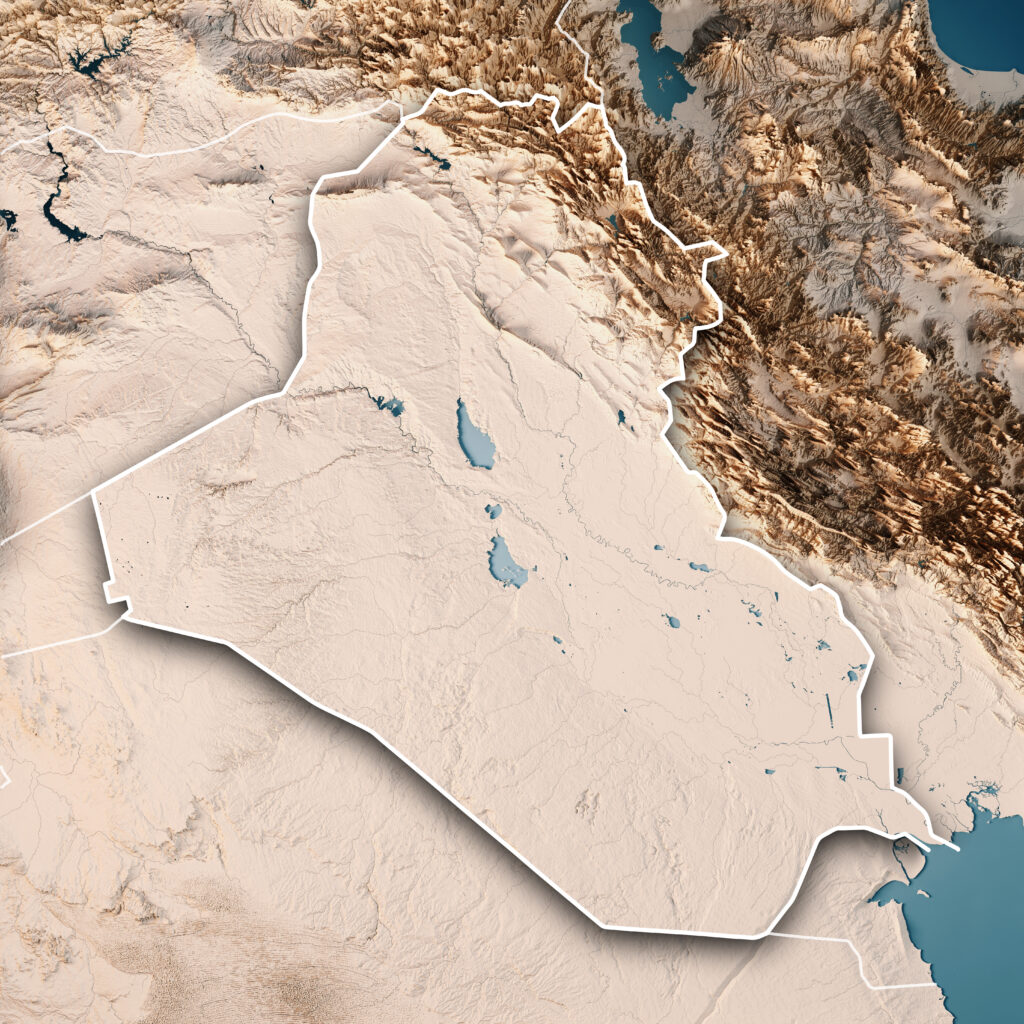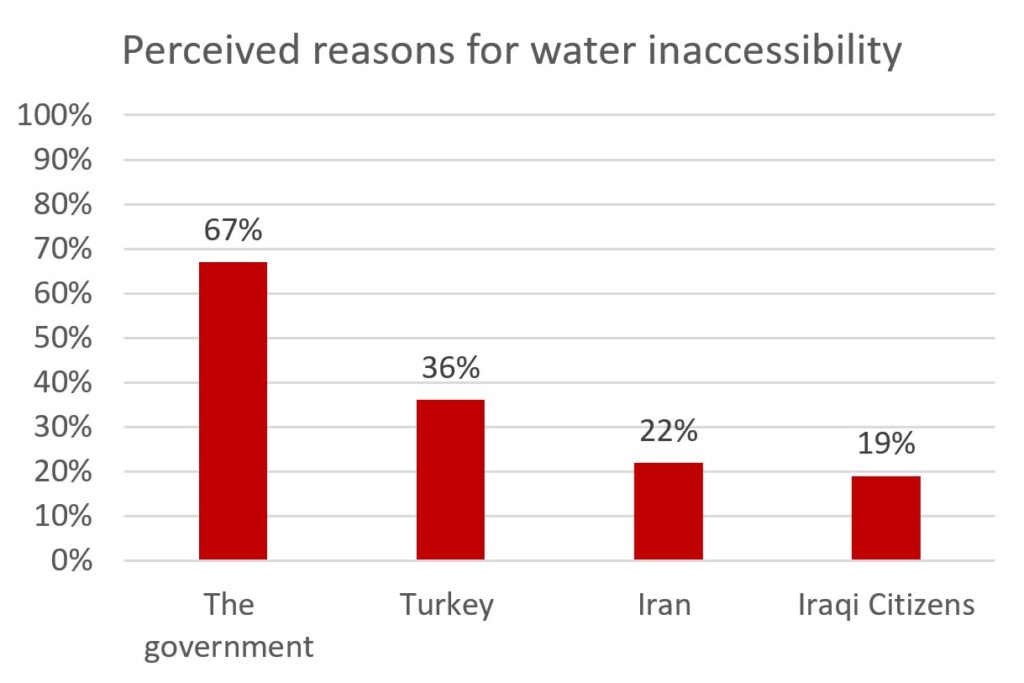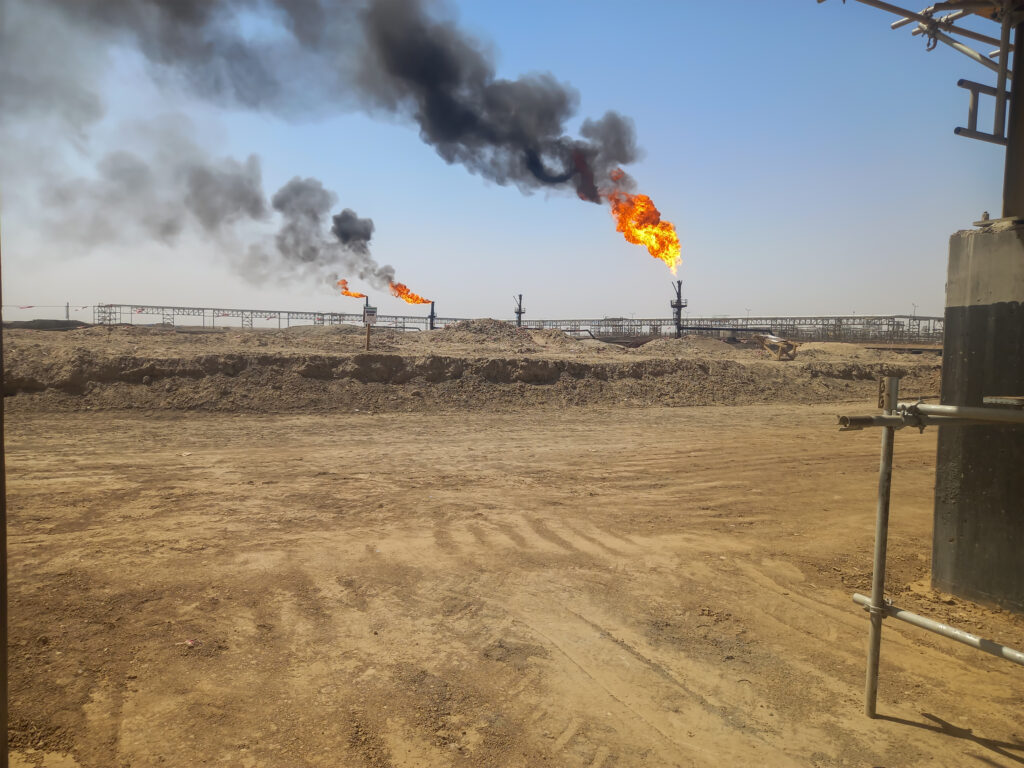By: Anna Lewis, Researcher 2

Photo 1: Aerial map of Iraq’s water resources
In August of 2023, Volkner Türk, United Nations’ High Commissioner for Human Rights, traveled to Iraq and noted that the country’s water crisis is “a window into a future that is now coming for other parts of the world.”1 Iraq, a country with a history of water scarcity, has experienced significant drops in water resources in recent years, which has led to domestic and international political tensions2. Since the 1980s, the water levels of the Tigris and Euphrates rivers, which supply 98% of Iraq’s water3, have decreased in flow by 30%4. In fact, water resources in Iraq are evaporating at a rate of 8-12 billion cubic meters a year5, equivalent to the cubic mass of nearly 120 billion shipping containers. This drop in water availability leaves the country open to resource exploitation for political and economic gain6. In response to these events, ORB conducted a survey in August of 2023 in Baghdad to better understand civilian perceptions and opinions concerning water security in Iraq.
Tense Relationships
ORB conducted 400 phone interviews among Baghdad residents. Results from the survey show that most (61%) respondents have little to no access to safe drinking water. These results confirm the depth and breadth of water scarcity in the city. However, the more interesting narrative is who Baghdadis blame for the issue. Figure 1 illustrates that Baghdad residents largely attribute blame for water inaccessibility to the government and surrounding countries, most notably Turkey and Iran.
Figure 1

A majority (67%) of Baghdad residents blame their own government for lack of water access. This belief likely stems from perceptions of poor diplomacy with other nations, supposed lack of domestic water allocation regulations, and overall mismanagement of available resources7, all of which have been common themes in political discourse, protest, and disagreement between citizens and the Iraqi government. Relatedly, weeks before the UN Water Conference in 2023 – where Iraq was a first-time participant – violent protests broke out over water insecurity in Southern Iraq8. These protests have become more frequent and focus principally on the diversion of water to oil projects in the south9.
Furthermore, respondents also blamed Turkey (36%) and Iran (22%) for water depletion. This likely stems from the fact that both Turkey and Iran have dictated water flow into Iraq along the Tigris and Euphrates rivers since the 1980s 10 11. Turkey alone controls nearly 40% of transboundary waters that flow into the country12. Iran, on the other hand, has continuously been accused of cutting water access into Iraq13. These trends have continued until today and are areas of contentious diplomacy for all downstream countries.
Finally, nearly a fifth (19%) of Baghdadis blame other Iraqi citizens for water access issues. This perception is likely due to increased competition for water in daily life via outdated irrigation canal systems that date back to the early Mesopotamians14. This system of irrigation, coupled with a lack of infrastructure improvements and temperature increases, allows for inequitable water distribution downstream, evaporation, and high levels of contamination, all of which fuel resource competition15. This signals a significant potential for domestic strife if competition for water continues to increase.

Photo 2: Oil flares
Hydroterrorism
ORB also found that nearly 60% of respondents are aware that armed groups exacerbate resource issues. The past decade alone has seen ISIS and other armed groups utilize water resources in Iraq to make strategic territorial advancements, incite fear into civilians through threat of drought or flood, and to bolster legitimacy16. For instance, after the Iraqi government declared its defeat of ISIS in 2017, many citizens who fled rural Iraq returned to find their wells filled with oil, rubble, or garbage17. It is also estimated that ISIS destroyed 400 out of 450 wells in the town of Sinun alone18. ISIS’ actions consequently forced farmers to leave again due to the high costs associated with the repair and replacement of irrigation systems. This influx of water-related terrorism, or hydroterrorism19, paints a bleak picture of what the future of violence will look like as the environmental state of the Earth worsens.
Understanding who and what Baghdad residents blame for water scarcity allows stakeholders to make strategic policy recommendations to resolve the issue and counter narratives that allow terrorist groups to incite unrest. This will become increasingly necessary as the climate changes and domestic strife grows. Notably, temperatures in Iraq are rising at a rate seven times faster than the current world average20. Coupled with plummeting precipitation averages21, these trends could foreshadow increasing occurrences of political violence, conflict between civilians, and humanitarian crisis on a much larger scale.
Conclusion
Environmental security is crucial to account for when attempting to address key issues like diplomacy, terrorism, economic deterioration, migration, and war. Who, and especially how, those impacted by climate change can be exploited should be top priority in the fight for peace and poverty alleviation. Noting high levels of inaccessibility to natural resources, like those found in Iraq, will likely be a key indicator of rising tension and susceptibility to conflict within and between countries.
For this reason, continuous research and monitoring of environmental security will be required to inform international policy. More focused efforts, like those included in the Water, Peace, and Security initiative, alongside ORB’s regional monitoring and public opinion research, will help to provide a clearer understanding of how resource inaccessibility drives conflict and instability across nations. Addressing environmental issues in security policy will pave the way for a safer, more sustainable future for both Iraqi citizens and the wider world alike.
______________________________________
Photo 1: by FrankRamspott, used with license from iStock
Photo 2: by karenfoleyphotography, used with license from iStock
1 Iraq water crisis could have regional consequences, UN human rights chief warns | ABC News
2 Water Wars: Navigating the Complexities of Hydropolitics and Hydroterrorism in the Middle East | The Science Survey
3 Zawahri, Neda A. “Stabilising Iraq’s Water Supply: What the Euphrates and Tigris Rivers Can Learn from the Indus.” Third World Quarterly, vol. 27, no. 6, 2006, pp. 1041–58. JSTOR, http://www.jstor.org/stable/4017739. Accessed 3 Jan. 2024.
4 Iraq | Water, Peace and Security (waterpeacesecurity.org)
5 Satellite Monitoring Reveals the Startling Extent of Iraq’s Water Crisis | The Century Foundation
6 The Weaponization of Water: Water Politics in the Middle East | Oxford Political Review | Oxford Political Review
7 Iraq’s Water Wars – Part 2 | Water | Al Jazeera
8 Local to Global: Tensions Course through Iraq’s Waterways | CSIS
9 Iraq’s oil boom blamed for worsening water crisis in drought-hit south | Water | The Guardian
10 Water Wars: Navigating the Complexities of Hydropolitics and Hydroterrorism in the Middle East | The Science Survey
11 Water scarcity could lead to the next major conflict between Iran and Iraq | Middle East Institute
12 Turkey and Transboundary Water | The Politics of Water
13 Iran, Iraq exchange accusations over water flow | Al-Monitor
14 Iraq’s Water Wars – Part 1 | Water | Al Jazeera
15 Iraq’s Water Wars – Part 1 | Water | Al Jazeera
16 The Weaponization of Water: Water Politics in the Middle East | OPR
17 Dead Land: Islamic State’s Deliberate Destruction of Iraq’s Farmland – Iraq | ReliefWeb
18 Iraq: Dead land: Islamic State’s deliberate destruction of Iraq’s farmland – Amnesty International
19 The dawning of hydro-terrorism | ISIL/ISIS | Al Jazeera
20 Climate Adaption Key to Iraq’s Stability and Economic Development | United States Institute of Peace
21 Caretta, M.A., A. Mukherji, M. Arfanuzzaman, R.A. Betts, A. Gelfan, Y. Hirabayashi, T.K. Lissner, J. Liu, E. Lopez Gunn, R. Morgan, S. Mwanga, and S. Supratid, 2022: Water. In: Climate Change 2022: Impacts, Adaptation and Vulnerability. Contribution of Working Group II to the Sixth Assessment Report of the Intergovernmental Panel on Climate Change . Cambridge University Press, Cambridge, UK and New York, NY, USA, pp. 551–712, doi:10.1017/9781009325844.006.
